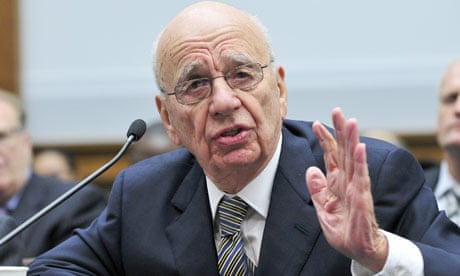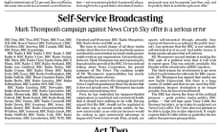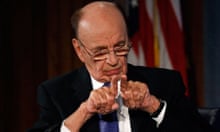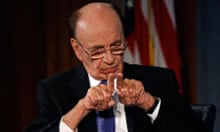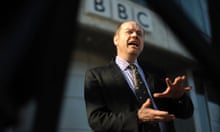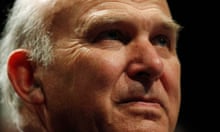It is March 2015, a couple of months before the general election. One media company bestrides British politics – spanning television, newspapers and the internet. It is more than twice the size of the BBC, with a turnover of £9bn. Controlled by Rupert Murdoch, it is called News Corporation.
Bound by none of the BBC's tradition of impartiality, the Murdoch family is deciding whether to endorse David Cameron for a second term. They meet in the knowledge that behind them lies the support of a company whose Sun and Times titles account for two-fifths of all newspapers sold in Britain and whose broadcasting operation is larger than the BBC, ITV and Channel 4 combined. This vision of financial and political power has so terrified rivals that they are already ganging up in alarm. From the Daily Telegraph to the Daily Mirror, from the Guardian to the Daily Mail, a joint letter has been prepared for the business secretary, Vince Cable. Sent today, the purpose of the memo is simple – to persuade Cable to block News Corp's proposed £8bn bid to take full control of BSkyB.
Some have called it Britain's "Berlusconi moment". Yet even in Italy, it could be argued that Silvio Berlusconi's dominance of the media is less complete. The Italian prime minister controls three mainstream television channels through his company Mediaset, but he is not allowed to own any newspapers in the country -although one small title is controlled by his brother.
Berlusconi or not, what the protest does present is an unexpected headache for David Cameron and the coalition government. The prime minister's natural supporters in Fleet Street are split. Leading the rebels is Lord Black, the Conservatives' director of communications under Michael Howard, who is now an executive director at the company behind the Daily Telegraph – with close support from Paul Dacre, editor-in-chief at the Daily Mail.
And while Cameron's party owes much to pre-election support from the Sun and the Times, including an endorsement from Simon Cowell in the red-top paper, the Liberal Democrats have no such debt.
What so frightens Britain's newspaper owners today is what would happen when the profits of Sky are aligned to the power of the Sun and the Times, creating a media company whose size and scale is unheard of in British history.
Sky is already larger than the BBC today, with a turnover of £5.9bn, while News International turns over £1.7bn. The BBC, by contrast, has a turnover of £4.8bn – but its licence fee income is widely expected to be cut, amid what BBC insiders describe as "neo-con" political pressure from Murdoch's newspapers.
On its own, Sky has the ability to outbid rivals at will. When the broadcaster snatched the rights to the next two seasons of Mad Men earlier this month, it offered £225,000 an episode. The BBC had been paying just £65,000. It spends more than £1bn a year on sport, this season sweeping up the rights to every single Champions League game, except for a single match a week that Uefa reserved for ITV.
Yet today, Rupert Murdoch's News Corp only owns 39.1% of the business, meaning that the majority of profits leak to outside investors, British and American pension funds. Sky's cadre of independent directors, whose ranks included Tony Blair's publisher Dame Gail Roebuck, the former Royal Mail chairman Allan Leighton and Jacques Nasser, who was chief executive of Ford, help ensure Sky's cashflows are directed to all of its shareholders' benefit. If News Corp were to wholly own the company, it would control a profit flow of £626m as measured at the last set of accounts, rising to £1.4bn by 2015. That's according to data prepared by the investment bank Nomura, which also predicts that Sky will have a turnover of £7.8bn on that date, nearly £2bn more than today, and a £1bn marketing budget, which could be used to help promote its newspapers as well as the broadcasters.
What the newspaper groups fear is that News Corp could use its extra wealth to cross-promote television and newspapers, a simple concept known in the media industry as "bundling".
Lord Puttnam, the filmmaker who is now deputy chairman of Channel 4, says: "Not only could it be possible for Sky subscribers to be offered print copies of the Sun or the Times cheaply – but there is the scope for massive discounts on electronic services that you or I haven't even thought of."
Sky has taken advantage of bundling in the past to grow at the expense of competitors. The company has long been the leader in pay television – its market share is 80% – but four years ago the company decided to get into broadband. It did so by undercutting BT, offering a basic service for free to existing subscribers, at a time when regulations prevented BT selling at a loss.
Sky's broadband service quickly grew, with half the customers taking the free product – and while the free offers have largely stopped, the company now has 2.6 million customers. Yet, when BT tried to complain about Sky's predatory pricing, the communications regulator, Ofcom, didn't investigate.
Murdoch has long pursued a strategy of price cutting at the Times and the Sun, which this year has been sold as cheaply as 20p. Accounts filed at Companies House suggest that already some of his British newspapers are having to be supported by other parts of the company. The loss for the Times and Sunday Times was £87.7m in the year to 28 June 2009, a level described by the Times's editor, James Harding, as "unsustainable" – and was partly supported by a £40.3m profit at the Sun and the News of the World.
Competition lawyers say Sky exhibits what is known as "increasing dominance" – a virtuous circle in which its financial success allows it to spend more money to bring in more customers, and in turn generate more profit. Sky's financial strength allows it to outbid rivals for an ever-increasing range of sports rights, and now it is moving into buying up US programming. There is technological innovation: this month it became the first broadcaster to launch a 3D channel, with coverage of the Ryder Cup. With a better service it wins more customers – a momentum that is hard to stop.
Over the past two decades, the growth in Murdoch's economic power went unchecked. Labour politicians were reluctant to take on the media mogul, partly because of the fear of losing the support of his newspapers but also because, in the words of one former minister, "it wasn't preordained that Sky would succeed – so why should they be punished?"
The fact, though, of a specific transaction – the £8bn attempt to buy Sky outright – does give competition authorities and politicians an opportunity to intervene. However, the problem for the anti-Murdoch camp is that competition authorities see television and newspapers as two separate markets, even if they are related. Anti-Murdoch lawyers concede that it would be hard to block the deal on pure competition grounds because Sky is getting no bigger in television and News Corp no bigger in newspapers as a result.
Cross-media ownership has instead historically been a matter for primary legislation rather than competition law, but today's rules lag behind the economic reality.
So the only clear-cut rule is that preventing News Corp or Sky owning more than 20% of ITV.
But after a share raid back in 2006 designed to prevent ITV falling into the hands of Virgin Media, Sky owns 7.5% – taking advantage of a loophole that allows the Murdoch family to have a crucial say in ITV's future if a foreign media company tried to mount a bid.
That is why any appeal to Vince Cable has to be made on the woolly grounds of "media plurality". The argument is that News Corp and Sky together are so large relative to rivals that their combined financial muscle will lead, inevitably, to the gradual erosion of the positions of rival newspapers.
"If they cut the price of the Times, I think it would be the Financial Times and the Daily Telegraph that would suffer first," said Puttnam.
Yet the plurality argument relies on an impossible-to-prove notion that other newspapers could be harmed or even collapse from some as yet unspecified cross-promotion or subsidy. It means that in reality, Fleet Street's most unlikely alliance has to raise the political temperature if it is to have a chance of succeeding. By coming together in this fashion, the Mirror, Mail, Guardian and Telegraph might just do that.
